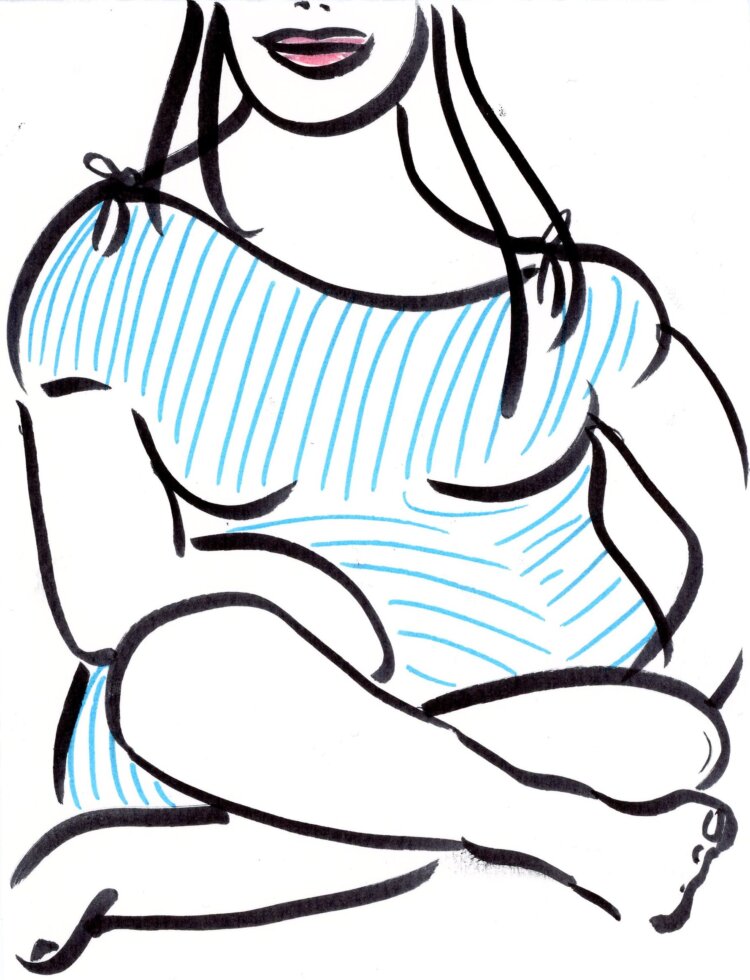
“No,” I said, absolutely determined that I would not get on the scale. I was only there for treatment of pink eye. What did my weight have to do with it, I wondered? At the age of 12, I was a bit chubby, mildly over what some might call a “normal” weight, but I’d gotten my first period and my breasts had grown two sizes only a few months before I came to be standing in the doctor’s office. Just recently, I’d hid behind the table for my 12th birthday photos, holding my beloved dog Marta up to be photographed in my place. My confidence was not exactly flourishing.
“You need to be weighed in to see the doctor,” an annoyed nurse remarked, scowling at me as though I was a cantankerous brat who wouldn’t comply for the hell of it.
In truth, I was usually extremely compliant. I didn’t want anyone to ever be mad at me. Since my father had committed suicide when I was 10, I’d turned to food for comfort, and fat had slowly but surely been expanding my thighs, belly and even my short neck, in all its insidious power. I felt mortified and could not deal with anyone seeing my weight.
I was insistent. I shook my head. I said, “I’m sorry, but I can’t be weighed.”
The nurse left after giving me a sharp look and eventually returned, saying the doctor would see me after all. Apparently leaving a teary-eyed little girl with pink eye in the lobby seemed bad form. I was led into a typical doctor’s room, climbed onto the examination table and waited.
Before the doctor came to see me, a couple of nurses came in and cheerfully gave me weight loss tips. They encouraged me to go on a diet. I hadn’t asked their opinion. When the doctor came in, he discussed my weight, too. If not for the pain, I’d have forgotten the pink eye altogether until I was prescribed an antibiotic and sent on my way, having spent 95 percent of the appointment discussing the “problem” of my size.
Eighteen years later, after I gained a lot of weight in a different traumatic situation, my experiences with doctors worsened. I found that even a trip to the emergency room became uncomfortably focused on my weight, rather than a terrible tooth infection that caused my face significant swelling. The doctor even asked if my swollen face was “normal.”
Some misguided doctors throw everything possible under the blanket of “weight problem” if someone has a problem with their health. According to The New York Times, one in three Americans is now obese, but the health care system is not properly prepared for this.
I’m not alone as a fat woman who has had negative experiences at doctors’ offices. I asked Ragen Chastain, the fat activist and writer behind Dances with Fat, about her experiences. “I’ve had doctors repeatedly ignore health concerns and, instead, prescribe weight loss for conditions including a broken toe, a separated shoulder, and strep throat,” she told me.
In the case of Ragen’s strep throat, she went to urgent care, and the rapid test was positive for strep. “The doctor came in and said, ‘What are you doing about your weight?’” she recalled. “I was incredibly sick, so I just rolled my eyes and asked, ‘What are you doing about my strep throat?’ He said, ‘It doesn’t matter what’s wrong with you, you’ll feel better if you lose 50 pounds.’”
By that point, Ragen was understandably frustrated, so she shot back, “Not if I have cancer.” She observed that he became exasperated, asking her what she wanted from them. When she asked what he gave thin people for strep throat, he hesitated before explaining that he gives thin people antibiotics. She said, “Well let’s have some of those, on the off chance that they also cure strep throat in fat people.”
Ragen did the right thing in advocating for herself, but it’s a shame that fat people, especially women, are in the position of having to do so. Maya Dusenbery, the author of Doing Harm: The Truth About How Bad Medicine and Lazy Science Leave Women Dismissed, Misdiagnosed, and Sick, cautions, “I think it’s very important for women to be aware that doctors not only have a lot of weight bias but that it especially impacts women–they’re more likely to advise women to lose weight than men and fixate on women’s weight and in doing so overlook potentially dangerous medical conditions.”
So, it’s up to us as women to advocate for ourselves. Although she pointed out that it shouldn’t be necessary to prepare for battle just to get the bare minimum of medical care, Ragen said that she has “found that, in general, asking if thin people get the problem I’m having, and then insisting that I get the same treatment that they would get has been an effective tool to overcome fatphobia-driven incompetence in health care.”
Maya agrees. “In general, if you are an ‘overweight’ woman and your doctor is telling you to ‘lose weight’’–either as a fix to particular symptoms or as general preventive health advice–you should fire them and find a better doctor,” she says. “Exercise and a nutritious diet is sound medical advice for people of all sizes, but ‘lose weight’ is at best an ineffective prescription and at worst a risky one. Doctors have no business pretending that is good medical advice.”
It’s up to us as women to advocate for ourselves.
Recently, I overcame my fears and finally went back to see a doctor after nine years, so I now have a primary care physician for the first time in my adult life. I did careful research to ensure that this doctor would be welcoming, and my fat vegan body got a clean bill of health. Ever since I was 12-years-old, my body has been a source of deep shame for me on many levels. I am not okay with wearing that shame anymore. Sometimes I marvel at the resiliency of the human body, and am trying so hard to take better care of the one I’m in.
In the interest of full disclosure, I should mention that I’m currently losing weight and am a quarter of the way toward my goal, but that is a personal choice for my own private reasons. With every fiber of my being, I support the size acceptance movement and the patient’s Healthcare Bill of Rights from the National Association to Advance Fat Acceptance.
I have no room for body shame in my life anymore. I don’t accept it in any part of my life, including when I go to see a doctor. And, my inner 12-year-old rebel still questions the necessity of weighing before every type of doctor’s appointment.


Grok Nation Comment Policy
We welcome thoughtful, grokky comments—keep your negativity and spam to yourself. Please read our Comment Policy before commenting.